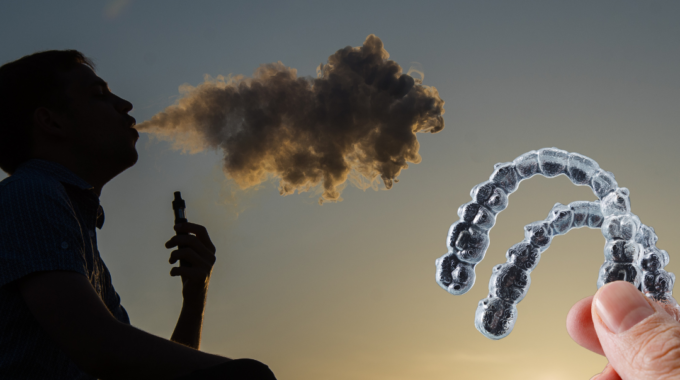When you think about braces, you probably picture straightening teeth and fixing bites, right? But…

10 New Years Resolutions that are damaging your teeth
It’s nice to start afresh in the new year and make plans for self-improvement. New year, new you…that’s how it goes, right?
The most common new year resolutions tend to be centred around getting in shape, eating healthier and being more active.
Whilst these all sound like sensible enough ideas, did you know that there are some healthy lifestyle choices that could seriously damage your teeth?
1-Apple cider vinegar:
Apple cider vinegar has been a popular home remedy for a multitude of ailments for centuries. Due to celebrity endorsements, there has been renewed interest in its potential health benefits, particularly with respect to weight loss.
However, its high acidity causes:
- Enamel erosion, which wears away the teeth causing discolouration
- Sensitivity
- Thinning of teeth making them prone to chipping.
To minimise this, I would suggest always drinking it diluted with water and through a straw, drinking in all-in-one sitting and rinsing with plain water afterwards.
2-Lemon water:
Lemon water is easy to make and is known to aide digestion, strengthen immunity and detox our bodies, so it is no wonder that it features high-up on new year resolution list.
The problem is the acidity of the lemon juice, especially if it is being sipped throughout the day, keeps the pH level within the mouth low, so the teeth are under a prolonged acidic attack. This results in:
- Enamel erosion
- Sensitivity to hot and cold
If lemon water is already part of your routine, I would certainly recommend changing how you consume it. Have it all in one sitting, again, with a straw and ensure the water is not too hot, as this will cause more rapid erosion and follow up with a few sips of plain water. Using a sensitive toothpaste may also help but avoid brushing within 30-40 minutes of consumption.
3-Fresh juice:
A healthy diet requires vitamins and minerals from food and drink to enable the body to work optimally. Vitamin D is important for teeth and vitamin C for gum health.
Fruit juice is an easy way of getting our required dose of daily vitamins and antioxidants, but they tend to be acidic with some containing the same amount or more sugar than Coca Cola (5 teaspoons of sugar per 200ml glass). So, as well as being a contributor in dental erosion, you’re at increased risk of tooth decay if you consume too much fresh fruit juice.
So, is there a ‘safe’ way to consume fruit juice?
- Choose 100% fruit juiceswith no added sugar.
- Restrict juice consumption to a 150ml glass a day.
- Pick apple or berry juice over citrus, which is worse for teeth and more likely to erode enamel than other juices.
- Avoid drinking juice between meals as this risks more damage than if taken with at mealtimes.
- Fruit juice softens tooth enamel, which protects teeth from decay, so wait one hour after drinking before brushing your teeth. This will give the enamel time to harden.
- Never drink juice from the bottle, or give juice to small children in bottles, as this bathes the teeth in juice and increases the chances of damage.
- Drink fruit juice heavily dilutedwith water.
- Rinse with water after drinking juice
Ideally, most of your fruit servings should come in the form of whole fruit, which is much better for your teeth.
4-Smoothies:
Increasing your fruit intake is always a good thing, and some may turn to smoothies as an easy way to do this, but beware as smoothies are packed with sugar and frequently acidic, which can cause:
- Tooth decay
- Enamel erosion
- Staining
To decrease the adverse effects of smoothies you should always drink them through a straw so that it mostly bypasses the teeth along with all the substances that might cause staining, acid, and sugar. Also changing to vegetable smoothies can significantly reduce the sugar content.
Lastly, rinse or sip plain water following a smoothie to wash away the acidic and sugary residue.
5-Diet drinks:
Whilst replacing full sugar carbonated drinks with their diet counterparts seems like a good idea, you have to careful about your consumption and frequency of intake.
Diet drinks don’t contain any sugar…which is great, but sugar is only one of the problems associated with soda. The level of acidity is a big concern and diet soda actually has higher acid levels than regular soda, as they contain more acidic regulators such as carbonic acid, citric acid, and phosphoric acid.
So, what can happen to your teeth:
- Enamel erosion
- Tooth sensitivity
To limit damage from fizzy drinks, try drinking through a straw. Or, better yet, opt for a tooth-friendly alternative such as water or milk. Remember, fizzy drinks continue to attack teeth for up to 20 minutes after your last sip, so be sure to finish them in one sitting.
6-Sparkling water:
Having enough water in your diet has plenty of health benefits. Each person’s requirements will vary depending on their health, age, size, and weight as well as activity levels, the type of job they do and the climate they live in, but around 6-8 glasses of water a day is recommended. The good news is that this includes other liquids such as tea and juice, but is sparkling water a safe alternative to still?
Sparkling water gets its fizz from carbon dioxide. A chemical reaction in your mouth turns the carbon dioxide into carbonic acid, giving the water a tangy, refreshing taste. This means that if you sip sparkling water frequently throughout the day, you risk:
- Enamel erosion
The good news is that sparkling water is minimally erosive, and as it contains no sugar, is still a healthier option when compared to sodas, especially if restricted to meal times using a straw. Just avoid the temptation to add a slice of lemon or lime.
7-High impact sports without a mouthguard:
Getting moving is great for both body and mind, but don’t forget about protecting your teeth.
Research has shown that between 13% and 39% of all injuries to teeth are sports related and that 1 in 4 children in the UK will injure or lose a front tooth at some stage.
During high impact sports such as rugby, hockey, martial arts and lacrosse, teeth are particularly vulnerable if a mouthguard is not worn, putting you at risk of:
- Tooth Fractures
- Tooth Displacement
- Soft tissue injuries to the lips and cheeks
- Knocking a tooth out (avulsion)
The best way to avoid these injuries is to have a well fitted sports guard to hand. For contact sports custom-made mouthguards, which are moulded to fit your teeth perfectly, offer the best protection.
8-Energy drinks:
Energy drinks are popular with athletes for enhanced performance, focusing the mind, or to overcome lethargy and tiredness. Whilst the electrolytes found in these beverages can help your body refuel and keep you hydrated during workouts, energy drinks are often full of sugar, acid and caffeine. Many also contain a special sticky substance used to keep the colour evenly distributed in the drink, which causes the sugar and acid stay on your teeth longer… this is bad news for your dental health.
So frequent consumption of energy drinks can be responsible for:
- Tooth decay
- Enamel erosion
- Tooth sensitivity
Of course, the easiest solution would be to swap your energy drink for simple water. But if you find that you need the odd one, avoid drinking small amounts over an extended period of time and be sure to rinse your mouth with water afterwards as some are acidic as cola drinks. As with other acidic foods and drinks, you should steer clear of brushing immediately after consuming as the acid softens the enamel.
9-Dried fruit:
In an attempt to be healthier, many of us turn to dried fruit to satisfy our sweet tooth. But they are not as good for us as you may think…well, not for your teeth, at least.
Drying fruit drains the water from them so that sugar is concentrated. In the process of drying, the fruits attain 7 times more sugar than their fresh form. In addition to this, they stick to the teeth and are difficult to remove, so whilst dried fruit might be nutritious, it is certainly not great for your teeth.
Some of the most common dental problems that dried fruits can cause are:
- Broken teeth
- Dental decay
- Teeth discoloration
In order to protect your teeth from potential damage, it’s recommended that you control the amount of dried fruit you eat- the ideal portion size is usually about 2 tablespoons, so beware of snacking directly from the packet.
Avoid varieties that have added sugar or that are sweetened with fruit juice, to minimize excessive calorie and sugar intake. And floss after eating, as dried fruit often gets stuck around the teeth, increasing the risk of tooth decay.
You can always try fresh fruits, and vegetables as alternatives.
10-new years Frequent snacking/grazing:
Eating little and often has become a popular way to avoid post-meal slumps and keep your energy up throughout the day, however, eating this way is not good for your teeth.
Whenever you eat, the bacteria in your mouth convert sugars in your food into acids which then attack the teeth. During meals times, there is a increase in saliva production which dilutes the harmful acids and washes it away, along with food debris. However, it still takes some time for saliva to neutralise all the acids within your mouth.
So, if you’re snacking every half an hour, your teeth aren’t getting a break from the acidic environment, which can lead to:
- tooth decay
By limiting the number of snacks to two or three a day and saving sugary or acidic foods and drinks for mealtimes, you can help reduce the risk of decay.
So, next time you compile your New Years Resolutions, just make sure they are as good for your teeth as they are for your mind, body and soul.



